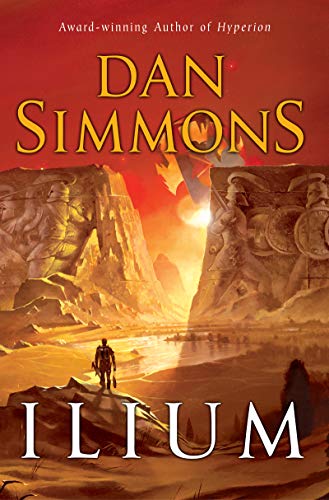Serg reviewed Ilium by Dan Simmons
Like 3 novels in 1
4 stars
"Illium" is a good SF book, with some interesting concepts.
It's a bit difficult to give an excerpt, because the book has three separate storylines. Only two of them come together, and even that only happens at the end.
The first storyline is that of Thomas Hockenberry, Ph.D., and is told in a first-person perspective. He is a scholar of classical literature and the Greek gods have tasked him with recording the events of the Trojan War. The Greek gods know about Homer's poem but are not allowed to know the contents, hence they set humans to check if the war is unfolding like Homer said it would.
The second storyline is about a group of robot-like beings called moravecs. They live and work at the asteroid belt and beyond. Their leaders have learned that there is a lot of quantum activity going on around Mars, which represents a threat …
"Illium" is a good SF book, with some interesting concepts.
It's a bit difficult to give an excerpt, because the book has three separate storylines. Only two of them come together, and even that only happens at the end.
The first storyline is that of Thomas Hockenberry, Ph.D., and is told in a first-person perspective. He is a scholar of classical literature and the Greek gods have tasked him with recording the events of the Trojan War. The Greek gods know about Homer's poem but are not allowed to know the contents, hence they set humans to check if the war is unfolding like Homer said it would.
The second storyline is about a group of robot-like beings called moravecs. They live and work at the asteroid belt and beyond. Their leaders have learned that there is a lot of quantum activity going on around Mars, which represents a threat to the entire solar system. (The details of the threat are a bit vague to the reader, but the moravecs take it seriously - and they know their science).
Four moravecs are sent on a mission to Mars to investigate.
It is clearly hinted that this "quantum activity" is in fact caused by the Greek gods, but the moravecs only meet Hockenberry and the Grecian pantheon at the end of the book.
A third storyline takes place on Earth, although not at the time of the Trojan war. The time seems to be about 2300 and humans are having a luxury life, their every need taken care of. Of course, in a novel, this means there is something wrong under the surface. A few of them suspect it and set out to learn more.
This third storyline never explicitly touches the other two, which makes "Illium" like reading two different novels.
The book ends, not quite on a cliffhanger, but with a lot of open conflict looming over both storylines. It is continued and concluded in the next book, "Olympos".
All in all, it as a good read with a nice mix of actual physics and speculation. The book includes discussions not only of Homer's Illiad, but also of Shakespeare and Proust. I was torn between giving it 3 and 4 stars, but the the lack of interaction between the different storylines made me settle on a lower score.

